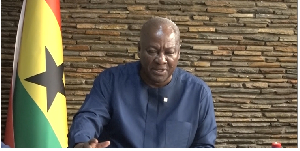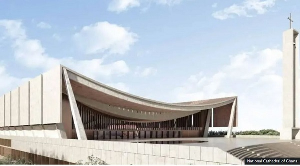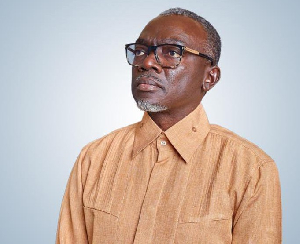Peace and security continue to be the anchor on which every society develops. Researches have proven that any country that has achieve socio-economic development did that on the pillars of sustainable peaceful and secured environment. For this reason, countries striving to improve the wellbeing and prosperity of their citizens continue to institute measures to achieve a peaceful society. Ghana is no exception. In fact, Ghana is ranked forty-fourth (44th) on the Global Peace Index and fourth (4th) in Sub-Saharan Africa, according to the Institute for Economics and Peace (IEP) report for 2019.
No country can achieve sustainable economic development in a lawless and chaotic environment and within its borders. Countries projected to be the fasters growing economies in the world are those with robust security structures and sustainable peace within their borders. The International Monetary Fund (IMF) has projected the economy of Ghana to grow at the rate of 8.8% in 2019, an increase of 3.2% in 2018. This economic progress could not have been achieved without a peaceful and tranquil environment which has led to increase in domestic production, trade and investment in all sectors of the economy.
The increasing complexity of human activities in the 21st century however continue to pose new security challenges in the areas of counter-terrorism, counter-insurgency, multilateral peace-keeping, threat to natural resources, intergroup and interpersonal conflict, human trafficking, kidnapping, money laundry, armed robbery just to mention but few. In the midst of these challenges, the situation is not that bad in Ghana since the country is the largest recipient of foreign direct investment in West Africa (SONA, 2020). This implies that investors are confident that their investment will be secured and protected, they will have access to justice and they will go about their economic activities without fear of losing their lives or investments.
The gains made at the national level could not have been achieved without the contributions from the regional and district levels. These lower tiers of governance play very significant role to the economic and peace and security rating of the country. The focus of this article is to highlight the security challenges at the district levels specifically the Builsa South District in an effort to contribute to the national average and make appropriate recommendations for consideration by authorities.
Over the years, the Builsa South District has made significant progress in the area of infrastructural and local economic development. This could not have been possible but for the relative peace and security in the district. In spite of that, there appear to be an emerging trend of armed robbery activities, interpersonal conflicts and other related crimes such as illegal harvesting of Rosewoods which has recently been curtailed due to the combine effort of the Regional Security Council (RESEC) and District Security Committee (DISEC).
The activities of armed robbers are however gaining prominence in the district. This was corroborated by the Minister for Interior in a statement to Parliament on the peace and security situation in the Builsa South District. These robbers often attack their victims on the Fumbisi-Sandema, Fumbisi-Wiesi, Fumbisi-Uwasi roads during Fumbisi market days. These criminal activities, if not check would derail the progress and prosperity of the district. For instance, within the period of 2014 – 2019, the district recorded about 12 armed robbery cases which have led to the loss of several lives and properties (Builsa South District Assembly, 2020).
But the question residents continue to ask is why do perpetrators of these crimes often escape arrest while the Police look on helpless?
A survey of the district revealed that there are many exit routes within the district which facilitate escape of criminals. This is also because of the dispersed nature of the district coupled with the modus-operandi of these criminals.
The lack of visibility of the police in the district may be another reason criminal activities take place on the blind side of the handful of police personnel in the district. In combating crime, police visibility in a particular locality is seen as an effective means of preventing crime. It is seen as a means of facilitating engagement and intervention which assure the people of their safety and enhance quality of life, reduce fear of crime, fear of intimidation and eventually reduce the incidence of crime.
Oftentimes, community members have complained of the lackadaisical attitude of the police in responding to crime situations. By the time they had arrived, the criminals might have bolted. Informants identities are often not protected hence making it difficult to volunteer criminal information to the police. Unfortunately, such disappointment is expressed in the form of hostile actions towards the police resulting in a police-community relation that is based on mistrust and hostility.
Nonetheless, there are alternative ways of examining the problem. The Police inability to adequately discharge the services that are expected of them by the public is also due to problem with the limited number of personnel, telecommunication, transportation, poor funding of the service, inadequate facilities and tools for the police to work, poor resource management and poor attitude and orientation among others.
The Builsa South District since its creation in June, 2012 continues to rely on the Builsa North District for police administration and support. The district lacks formidable Police force and the required number of personnel to meet the current trend of security challenges facing the district. The current staff strength stands at eleven (11) personnel for a district with a population of 36, 514. This implies that one (1) police man safeguards 3,319 of the district’s population which is far below the United Nations standard of one (1) policeman to 500 citizens.
The Fumbisi Police Station also lack adequate logistics such as telecommunication, transportation, funding, personnel accommodation and offices, tools and other resources to enable them undertake their operations effectively and efficiently and to respond to crime scene on time.
What is the effect of the limited Police personnel and logistics on the economy of the district?
The Builsa South District is one of the vibrant districts in the Upper East Region with so much potential for economic prosperity. It is predominantly an agrarian economy that engages over 70% of the district population in direct agriculture and agro-related activities. Its comparative advantage is rice farming which is supported by the Gbedembilisi, Wiesi and Fumbisi rice valleys. It is one of the districts in the region endowed with forest reserves and other natural resources.
In spite of these potentials, criminal activities are derailing the progress in the district. The wanton destruction of forest reserves for illegal harvesting of Rosewoods with impunity has negatively affected the environment of the Builsa South District and continue to impact the health and wellbeing of the citizens and other species. The importance of our natural environment to our survival and the need to safeguard it cannot be overemphasized. This was also highlighted in the President’s State of the Nation Address. He said “the other area of our lives in which we can and should start making a change is the care of the environment. We are in danger of destroying our blessed country. Ours is a beautiful country. If we claim to love our country, we must take care of the lands, the trees, the water bodies and the animals” (SONA, 2017).
These illegal log harvesters only make huge financial benefits at the expense of the poor and the vulnerable whose daily livelihoods depend on the environment. In all this the Police look on helpless while these criminal acts are committed. This is corroborated by the Member of Parliament for that locality in a statement to Parliament on the illegal felling and harvesting of Rosewood and its attendant destruction on the environment in the Builsa South District. He said “efforts by the District Authorities to stop the illegal logging are not being complemented by the Police” (Apaak, 2017).
The activities of these wrongdoers are also having negative effect on local economic development activities within the area. Most of these crimes are often committed during Fumbisi market days. For instance, the gruesome murder of a young man in the Fumbisi market on 20th May, 2020 continues to leave the people in a state of shock and fear. This has led to the issuance of a directive by the DISEC for all market activities to close by 6pm (Builsa South District Assembly, 2020). Until the emergence of these criminal activities, the Fumbisi market will often start on the eve of the market day and ends late in the night.
According to Revenue Superintendent at the Assembly, “the state of insecurity in the market is affecting revenue mobilization of the Assembly. If the fear and the directive by the DISEC on the early closure of the Fumbisi market continue, it is going to negatively affect the revenue projection of the Assembly for this year which will subsequently affect the execution of its planned programmes and projects”.
As indicated earlier, the progress and economic prosperity of every society is formed on the foundation of peace and security. Therefore every effort and resources must be harnessed and channeled to ensuring the maintenance and consolidation of peace and security in the district. This will assure traders and investors that their investments are secured and subsequently provide the general public the assurance to go about their daily activities in a peaceful environment.
Recommendation to improve security situation in the district
These effects are real and impacting the socio-economic activities of district. This calls for urgent attention and pragmatic strategies to mitigate and prevent the negative impact of criminal activities on the progress of the district. The following recommendations could be considered to mitigate criminal activities in the Builsa South District:
i. The Ministry of Interior should facilitate the deployment of additional Police personnel to augment the existing number of eleven (11) in order to meet the United Nations standard of one (1) policeman to 500 citizens. This will also enhance Police visibility in the district to wade off criminal activities.
ii. The Ministry of Interior should facilitate the establishment of a District Police Headquarters at Fumbisi, the capital of the district to be manned by a District Police Commander.
iii. The Fumbisi Police Station should be equipped with adequate logistics such as telecommunication, transportation, funding, personnel accommodation and offices, and the required tools to enable them execute their duties effectively and efficiently.
iv. Creation of Police Posts at Gbedema, Uwasi, Kanjarga, Wiesi and Gbedembilisi will go a long way to reduce and prevent crime in the district.
v. Issues of security should be prioritized in the Builsa South District Assembly’s Plans and Budgets.
vi. The Builsa South District Assembly should continue its periodic support to the Police to facilitate their patrolling activities during Fumbisi market days.
vii. The District Authorities should work in close collaboration with chiefs, opinion leaders and youth leaders in the various communities within the district to form Community Watch-Dog Committees (CWDC) to complement the effort of the Police.
viii. Public vehicles should be given Police escort during Fumbisi market days from Fumbisi to Sandema to prevent attack by armed robbers.
ix. The Fumbisi Police should work in close collaboration with sister security Services such as the Bureau of National Investigation (BNI), Military Intelligence in the region and other Police Stations in districts sharing borders with the Builsa South District to mitigate the activities of criminals.
x. Police intelligence is based on relevant information. Therefore, citizens should be encouraged to provide relevant and timely information to the Police to enable them apprehend criminals.
To conclude, peace and security of every society should be seen as a shared responsibility. As the citizens are playing their complementary role of ensuring a peaceful environment, so should government play its role by instituting appropriate security structures and architecture to protect the lives and properties of citizens. The importance of peace and security at the grassroots level cannot be overemphasized since it contributes significantly to the overall peace and security rating of the country and must therefore be guarded jealously.
Opinions of Sunday, 21 June 2020
Columnist: Yanick Noah Agboado



















